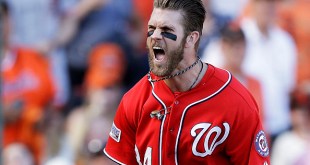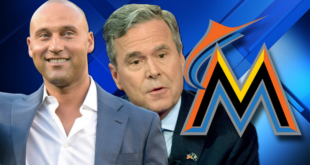You may have heard that Bryce Harper signed a contract extension last week: $21.625 million for the 2018 season. Harper is already earning $13.625 million for the 2017 season, plus incentives, so the new deal represents an $8 million raise for Harper’s services.
But here’s the thing…although one-year deals are the norm for players who are not yet eligible to become free agents, it’s not common for a deal like this to be signed in the middle of a season. So what’s the deal with this deal, exactly?
To start, let’s get this out of the way: Bryce Harper is one of the three best players in baseball today, and probably has the greatest upside of anyone in the game that isn’t named Trout. He won the 2015 NL MVP at the age of 22, and likely still hasn’t even come into his prime. He had a more pedestrian 2016, but the stats he’s putting up this year are exceptional by any definition.
So as one of the best players in baseball, it makes sense the Washington Nationals signed him for $21.625 million (which is a record for an arbitration-eligible player by the way). But if you’re the Nationals, why sign Harper for just one year? If Harper is as good and marketable as he appears to be, and the Nationals are clearly willing and able to pay him a boatload of cash, why not sign him to a multi-year deal like the Angels did with Mike Trout? Similarly, why wouldn’t Bryce want the security of a long-term deal with a team he appears to like right now, like Trout did with the Angels? There are many factors at play here, but at it’s most basic level, the answer to both of those questions has to do with Washington’s club control over Harper.
Because Harper has less than six years of service time in the majors, the Washington Nationals have club control over him through the end of the 2018 season. That means the Nationals have exclusive rights to negotiate and sign a deal with Harper, such that no other team can even attempt to sign Harper until he eclipses six years of service time. Basically, no other team could have negotiated with or signed Harper for 2018, even if the Nationals hadn’t signed Harper for the 2018 season.
So if no other team can bid against the Nationals and drive up the price for Harper, why would Washington pay him so much money for one year? Answer: arbitration. In baseball, arbitration is the process through which compensation is determined for a player who is still under club control, but who has at least 3 years of major league service time.[i] If the player and his team cannot agree on compensation prior to a season, the player may file for arbitration. Both the player and the team submit a proposed compensation amount to an arbitrator, and then make their case for why the arbitrator should choose their submitted amount. The arbitrator may only choose either the team’s or the player’s submitted amount to award the player..nothing in between.
What does all this mean in the long run for Harper and the Nationals? Well, I have some thoughts on that:
- The Nationals avoided a potentially contentious arbitration process with Harper, who is represented by super agent Scott Boras and undoubtedly would have demanded a high price in making Harper’s case at arbitration. Parties tend to want to avoid arbitration because it can seriously harm the relationship between a team and the player regardless of the outcome. Teams have every reason to use unfavorable statistics and comparisons to other players to argue why the player is not worth the amount they are seeking. Regardless of whether the player is successful in arbitration, there’s a good chance he’ll be left with a bad taste in his mouth after hearing that team representatives emphasized his failings and belittled his accomplishments in the hearing.
- There aren’t too many negative things to say about Harper at this point in his career. However, had he and the Nationals gone to arbitration before the 2018 season, it’s likely Washington would have cited his 2016 season as a reason why the arbitrator should award him the lesser amount. How would Harper view that when talking with the Nats about a potential long-term deal? Washington clearly didn’t want to find out.
- The Nationals are probably hoping Harper will view the record payday for an arbitration eligible player as a sign of good will, potentially bolstering a sense of loyalty to the Nats when he goes after his first free agent deal in 2019. The Nats will need all the help they can get if they want Harper back, because reports are that he could command a record-shattering contract of more than $400 million-and some are even speculating he could get a near-unfathomable $500 million.
- The amount the Nationals agree to pay Harper for the 2018 season is likely higher than what he would have been awarded in arbitration. Harper is an other-worldly talent, but an $8 million raise for a player still under team control is huge, and generally not likely to occur in arbitration.
- If the Nationals are serious about keeping Harper past the 2018 season, it makes every bit of sense for them to sign him to a long-term extension right now. Every day he gets closer to free agency in 2018, keeping him in a Nationals uniform gets more and more expensive. But of course, that’s much easier said than done, and I have no doubt the Nationals would be more than happy to discuss signing a long-term deal before Harper hits free agency, if they haven’t already. Back in December, Boras said he has had no conversations with the Nats regarding a long-term deal. But a USA Today report contradicted that claim, citing a “high-ranking Nationals executive” who said Harper is seeking at least 10 years and a minimum of $400 million. There’s certainly more to that story than we know, but it’s impossible to tell exactly where the two sides are at this point.
- Unless he has an overwhelming sense of devotion to the Nationals that makes him comfortable earning less money than he could (or a premonition that a career-altering injury is in his future), it makes all the sense in the world for Harper to wait until after the 2018 season to become a free agent. Baseball has no shortage of teams willing to spend on players like Harper: the Yankees, Dodgers, and Red Sox come to mind, and the Philadelphia Phillies currently have no one signed for the 2019 season other than Odubel Herrera, so they should have money to burn after 2018 ends. And when you combine that with the fact that Boras is Harper’s agent, all signs point to Harper hitting the market to find out just what he’s worth.
Contract negotiations in both baseball and the business world are delicate processes. In many instances, the groundwork for deals are laid long before contract documents are signed. The Nationals are trying to lay that groundwork by showing how much they value Harper, thereby preserving a good relationship and suggesting that they would like to have him back for 2019 and beyond. But in the end, this all comes down to how much Harper wants to get paid, and whether that number will end up being something the Nationals can handle.
[i] A description of how service time is calculated for major league players can be found on MLB’s website. I addressed service time in an article about Kris Bryant and the Cubs back in 2015: http://thesportsesquires.com/nobody-puts-bryant-in-the-minors-except-for-mr-epstein/.
 The Sports Esquires Putting Sports on Trial
The Sports Esquires Putting Sports on Trial





